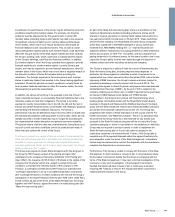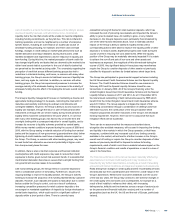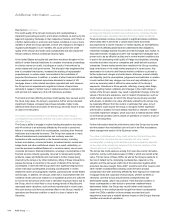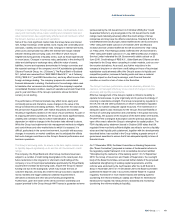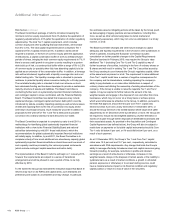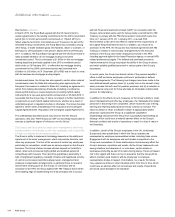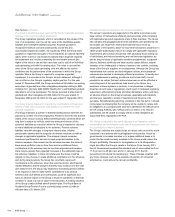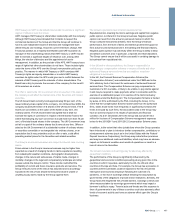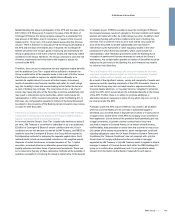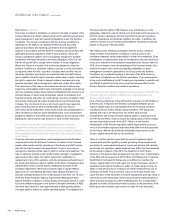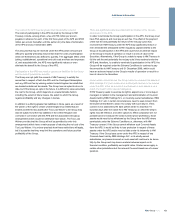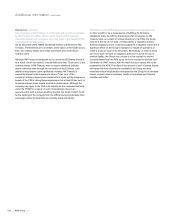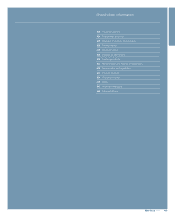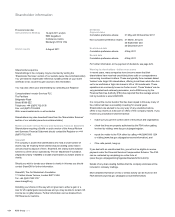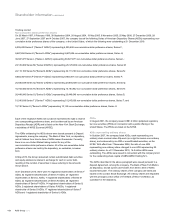RBS 2010 Annual Report Download - page 418
Download and view the complete annual report
Please find page 418 of the 2010 RBS annual report below. You can navigate through the pages in the report by either clicking on the pages listed below, or by using the keyword search tool below to find specific information within the annual report.Risk factors continued
The Group’s results have been and could be further materially adversely
affected in the event of goodwill impairment.
The Group capitalises goodwill, which is calculated as the excess of the
cost of an acquisition over the net fair value of the identifiable assets,
liabilities and contingent liabilities acquired. Acquired goodwill is
recognised initially at cost and subsequently at cost less any
accumulated impairment losses. As required by IFRS, the Group tests
goodwill for impairment annually or more frequently, at external reporting
dates, when events or circumstances indicate that it might be impaired.
An impairment test involves comparing the recoverable amount (the
higher of the value in use and fair value less cost to sell) of an individual
cash generating unit with its carrying value. The value in use and fair
value of the Group’s cash generating units are affected by market
conditions and the performance of the economies in which the Group
operates. Where the Group is required to recognise a goodwill
impairment, it is recorded in the Group’s income statement, although it
has no effect on the Group’s regulatory capital position. For the year
ended 31 December 2008, the Group recorded a £32.6 billion accounting
write-down of goodwill and other intangibles principally relating to RBS
Holdings N.V. (formerly ABN AMRO Holding N.V.) and NatWest goodwill
allocated to non-core businesses. The Group recorded a write down of
goodwill and other intangibles of £363 million for the year ended 31
December 2009 and £10 million for the year ended 31 December 2010.
The Group may be required to make further contributions to its pension
schemes if the value of pension fund assets is not sufficient to cover
potential obligations.
The Group maintains a number of defined benefit pension schemes for
past and a number of current employees. Pensions risk is the risk that the
assets of the Group’s various defined benefit pension schemes which are
long term in nature do not fully match the timing and amount of the
schemes’ liabilities as a result of which the Group is required or chooses
to make additional contributions to the schemes. Pension scheme
liabilities vary with changes to long-term interest rates, inflation,
pensionable salaries and the longevity of scheme members as well as
changes in applicable legislation. The scheme’s assets comprise
investment portfolios that are held to meet projected liabilities to the
scheme members. Risk arises from the schemes because the value of
these asset portfolios’ returns from them and any additional future
contributions to the schemes may be less than expected and because
there may be greater than expected increases in the estimated value of
the schemes’ liabilities. In these circumstances, the Group could be
obliged, or may choose, to make additional contributions to the schemes,
and during recent periods, the Group has voluntarily made such
contributions to the schemes. Given the recent economic and financial
market difficulties and the prospect that they may continue over the near
and medium term, the Group may experience increasing pension deficits
or be required or elect to make further contributions to its pension
schemes and such deficits and contributions could be significant and
have an adverse impact on the Group’s results of operations or financial
condition or result in a loss of value in the Securities. A funding valuation
of the Group’s major defined benefit pension plan, The Royal Bank of
Scotland Group Pension Fund is currently being carried out with an
effective date of 31 March 2010.
Operational risks are inherent in the Group’s operations.
The Group’s operations are dependent on the ability to process a very
large number of transactions efficiently and accurately while complying
with applicable laws and regulations where it does business. The Group
has complex and geographically diverse operations and operational risk
and losses can result from internal and external fraud, errors by
employees or third parties, failure to document transactions properly or to
obtain proper authorisation, failure to comply with applicable regulatory
requirements and conduct of business rules (including those arising out
of anti-bribery, anti-money laundering and anti-terrorism legislation, as
well as the provisions of applicable sanctions programmes), equipment
failures, business continuity and data security system failures, natural
disasters or the inadequacy or failure of systems and controls, including
those of the Group’s suppliers or counterparties. Although the Group has
implemented risk controls and loss mitigation actions, and substantial
resources are devoted to developing efficient procedures, to identify and
rectify weaknesses in existing procedures and to train staff, it is not
possible to be certain that such actions have been or will be effective in
controlling each of the operational risks faced by the Group. Any
weakness in these systems or controls, or any breaches or alleged
breaches of such laws or regulations, could result in increased regulatory
supervision, enforcement actions and other disciplinary action, and have
an adverse impact on the Group’s business, applicable authorisations
and licences, reputation, results of operations and the price of its
securities. Notwithstanding anything contained in this risk factor, it should
not be taken as implying that the company will be unable to comply with
its obligations as a company with securities admitted to the Official List of
the UK Listing Authority (the “Official List”) nor that it, or its relevant
subsidiaries, will be unable to comply with its or their obligations as
supervised firms regulated by the FSA.
The Group is exposed to the risk of changes in tax legislation and its
interpretation and to increases in the rate of corporate and other taxes in
the jurisdictions in which it operates.
The Group’s activities are subject to tax at various rates around the world
computed in accordance with local legislation and practice. Action by
governments to increase tax rates or to impose additional taxes or to
restrict the tax reliefs currently available to the Group would reduce the
Group’s profitability. Revisions to tax legislation or to its interpretation
might also affect the Group’s results in the future. From January 2011,
the UK Government increased the standard rate of value added tax from
17.5 per cent. to 20 per cent. and on 1 January 2011, the UK
Government introduced the banking levy. These changes, together with
any future changes, such as the possible introduction of a financial
activities tax, could reduce the Group’s profitability.
RBS Group 2010416
Additional information continued



